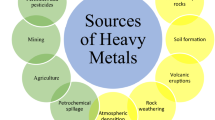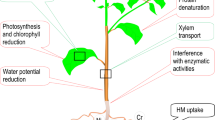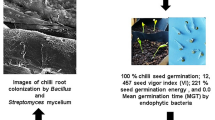Abstract
Bacteria have potential to tolerate and reduce metals. This study evaluated the potential of selected bacterial strains in tolerating and reducing chromium (Cr). Six bacterial strains (Rhizobium miluonense LCC01, LCC04, LCC05, and LCC69; Rhizobium pusense LCC43; and Agrobacterium deltaense LCC50) showed tolerance to Cr(VI) (16 and 32 μg mL−1), reduction potential of Cr(VI) (from 50 to 80%), and efficiency in producing exopolysaccharides. Rhizobium pusense LCC43 exhibited the highest tolerance (128 μg mL−1), reduction potential of Cr(VI) (from 80 to 100%), and efficiency in producing exopolysaccharides. These results suggested that this strain may have the potential to be used in the bioremediation of soils contaminated with Cr(VI).




Similar content being viewed by others
Data availability
The datasets generated during and/or analyzed during the current study are available from the corresponding author on reasonable request.
References
Alam MZ, Malik A (2008) Chromate resistance, transport and bioreduction by Exiguobacterium sp. ZM-2 isolated from agricultural soil irrigated with tannery effluent. J Basic Microbiol 48:416–420. https://doi.org/10.1002/jobm.200800046
Aljuboori AHR, Idris A, Abdullah N, Mohamad R (2013) Production and characterization of a bioflocculant produced by Aspergillus flavus. Bioresour Technol 127:489–493. https://doi.org/10.1016/j.biortech.2012.09.016
Araujo ASF, Melo WJ, Araujo FF, Van den Brink PJ (2020) Long-term effect of composted tannery sludge on soil chemical and biological parameters. Environ Sci Pollut Res Int 27:41885–41892. https://doi.org/10.1007/s11356-020-10173-9
Ayangbenro AS, Babalola OO, Aremu OS (2019) Bioflocculant production and heavy metal sorption by metal resistant bacterial isolates from gold mining soil. Chemosphere 231:113–120. https://doi.org/10.1016/j.chemosphere.2019.05.092
Baldiris R, Acosta-Tapia N, Montes A, Hernández J, Vivas-Reyes R (2018) Reduction of hexavalent chromium and detection of chromate reductase (ChrR) in Stenotrophomonas maltophilia. Molecules. https://doi.org/10.3390/molecules23020406
Castellane TCL, Lemos MVF, Lemos EGM (2014) Evaluation of the biotechnological potential of Rhizobium tropici strains for exopolysaccharide production. Carbohyd Polym 111:191–197. https://doi.org/10.1016/j.carbpol.2014.04.066
Chaudhary T, Gera R, Shukla P (2021) Deciphering the potential of Rhizobium pusense MB-17a, a plant growth-promoting root endophyte, and functional annotation of the genes involved in the metabolic pathway. Front Bioeng Biotechnol 8:617034. https://doi.org/10.3389/fbioe.2020.617034
Cheung KH, Gu J-D (2007) Mechanism of hexavalent chromium detoxification by microorganisms and bioremediation application potential: a review. Int Biodeterior Biodegradation 59:8–15. https://doi.org/10.1016/j.ibiod.2006.05.002
Chovanec P, Sparacino-Watkins C, Zhang N, Basu P, Stolz JF (2012) Microbial reduction of chromate in the presence of nitrate by three nitrate respiring organisms. Front Microbiol. 3:416. https://doi.org/10.3389/fmicb.2012.00416
Felsenstein J (1988) Phylogenies from molecular sequences: inference and reliability. Annu Rev Genet 22:521–565
Gupta P, Diwan B (2017) Bacterial exopolysaccharide mediated heavy metal removal: a review on biosynthesis, mechanism and remediation strategies. Biotechnol Rep (Amst). 13:58–71. https://doi.org/10.1016/j.btre.2016.12.006
Gutiérrez AM, Cabriales JJP, Vega MM (2010) Isolation and characterization of hexavalent chromium-reducing rhizospheric bacteria from a wetland. Int J Phytoremediation. 12:317–334. https://doi.org/10.1080/15226510902968118
Haque MM, Mosharaf MK, Haque MA, Tanvir MZH, Alam MK (2021) Biofilm formation, production of matrix compounds and biosorption of copper, nickel and lead by different bacterial strains. Front Microbiol. 12:615113. https://doi.org/10.3389/fmicb.2021.615113
Karim ME, Sharmin SA, Moniruzzaman M, Fardous Z, Das KC, Banik S, Salimullah M (2020) Biotransformation of chromium (VI) by Bacillus sp. isolated from chromate contaminated landfill site. Chemistry and Ecology, 36(10):922–937. https://doi.org/10.1080/02757540.2020.1799992
Karthik C, Oves M, Sathya K, Sri Ramkumar V, Arulselvi PI (2017) Isolation and characterization of multi-potential Rhizobium strain ND2 and its plant growth-promoting activities under Cr(VI) stress. Arch Acker Pflanzenbau Bodenkd. 63:1058–1069. https://doi.org/10.1080/03650340.2016.1261116
Kaza S, Congyuan YL (2018) What A waste 2.0: A global snapshot of solid waste management to 2050. World Bank Publications, Washington DC
Leonel TF, Moretto C, Castellane TCL et al (2019) The Influence of Cooper and Chromium Ions on the Production of Exopolysaccharide and Polyhydroxybutyrate by Rhizobium tropici LBMP-C01. J Polym Environ 27:445–455. https://doi.org/10.1007/s10924-018-1359-4
Miranda ARL, Antunes JEL, Araujo FF, Melo VMM, Bezerra WM, Van den Brink PJ, Araujo ASF (2018) Less abundant bacterial groups are more affected than the most abundant groups in composted tannery sludge-treated soil. Sci Rep. 8:1–9. https://doi.org/10.1038/s41598-018-30292-1
Pan X, Liu Z, Chen Z, Cheng Y, Pan D, Shao J, Lin Z, Guan X (2014) Investigation of Cr(VI) reduction and Cr(III) immobilization mechanism by planktonic cells and biofilms of Bacillus subtilis ATCC-6633. Water Res. 55:21–29. https://doi.org/10.1016/j.watres.2014.01.066
Patra RC, Malik S, Beer M, Megharaj M, Naidu R (2010) Molecular characterization of chromium (VI) reducing potential in gram positive bacteria isolated from contaminated sites. Soil Biol Biochem. 42:1857–1863. https://doi.org/10.1016/j.soilbio.2010.07.005
Pattanapipitpaisal P, Brown NL, Macaskie LE (2001) Chromate reduction and 16S rRNA identification of bacteria isolated from a Cr(VI)-contaminated site. Appl Microbiol Biotechnol. 57:257–261. https://doi.org/10.1007/s002530100758
Raaman N, Mahendran B, Jaganathan C, Sukumar S, Chandrasekaran V (2012) Removal of chromium using Rhizobium leguminosarum. World J Microbiol Biotechnol. 28:627–636. https://doi.org/10.1007/s11274-011-0856-6
Rocha SMB, Antunes JEL, Silva AVCR, Oliveira LMS, Aquino JPA, Melo WJ, Figueiredo MVB, Araujo ASF (2019) Nodulation, nitrogen uptake and growth of lima bean in a composted tannery sludge-treated soil. Cienc Rural. https://doi.org/10.1590/0103-8478cr20190301
Sahoo H, Kisku K, Varadwaj KSK et al (2022) Mechanism of Cr(VI) reduction by an indigenous Rhizobium pusense CR02 isolated from chromite mining quarry water (CMQW) at Sukinda Valley. Environ Sci Pollut Res, India. https://doi.org/10.1007/s11356-022-22264-w
Saitou N, Nei M (1987) The neighbor-joining method: a new method for reconstructing phylogenetic trees. Mol Biol Evol. https://doi.org/10.1093/oxfordjournals.molbev.a040454
Sheng GP, Yu HQ, Li XY (2010) Extracellular polymeric substances (EPS) of microbial aggregates in biological wastewater treatment systems: a review. Biotechnol Adv. 28:882–894. https://doi.org/10.1016/j.biotechadv.2010.08.001
Soni SK, Singh R, Awasthi A, Singh M, Kalra A (2013) In vitro Cr(VI) reduction by cell-free extracts of chromate-reducing bacteria isolated from tannery effluent irrigated soil. Environ Sci Pollut Res Int. 20:1661–1674. https://doi.org/10.1007/s11356-012-1178-4
Wani PA, Wahid S, Singh R, Kehinde AM (2018) Antioxidant and chromium reductase assisted chromium (VI) reduction and Cr (III) immobilization by the rhizospheric Bacillus helps in the remediation of Cr (VI) and growth promotion of soybean crop. Rhizosphere. 6:23–30. https://doi.org/10.1016/j.rhisph.2018.01.004
Weisburg WG, Barns SM, Pelletier DA, Lane DJ (1991) 16S ribosomal DNA amplification for phylogenetic study. J Bacteriol. 173:697–703. https://doi.org/10.1128/jb.173.2.697-703.1991
Zhu Y, Yan J, Xia L, Zhang X, Luo L (2019) Mechanisms of Cr(VI) reduction by Bacillus sp. CRB-1, a novel Cr(VI)-reducing bacterium isolated from tannery activated sludge. Ecotoxicol Environ Saf. 186:109792. https://doi.org/10.1016/j.ecoenv.2019.109792
Funding
This work was supported by Conselho Nacional de Desenvolvimento Cientifico e Tecnologico (CNPq Grant 305069/2018-1) and Fundacao de Amparo a Pesquisa do Estado do Piaui (FAPEPI). Sandra M. B. Rocha has received scholarship from FAPEPI. Erika V. Medeiros and Ademir S.F. Araujo are fellow of CNPq.
Author information
Authors and Affiliations
Contributions
All authors contributed to the study conception and design. Material preparation, data collection, and analysis were performed by SMBR, MRdaA, MKLC, TCdaSS, RMC, JELA, and LMdeSO, The first draft of the manuscript was written by FdeAN, EVdeM, APdeAP, and ASFA: and all authors commented on previous versions of the manuscript. All authors read and approved the final manuscript.
Corresponding author
Ethics declarations
Conflict of interest
The authors have no relevant financial or non-financial interests to disclose.
Additional information
Communicated by Erko Stackebrandt.
Publisher's Note
Springer Nature remains neutral with regard to jurisdictional claims in published maps and institutional affiliations.
Supplementary Information
Below is the link to the electronic supplementary material.
Rights and permissions
Springer Nature or its licensor (e.g. a society or other partner) holds exclusive rights to this article under a publishing agreement with the author(s) or other rightsholder(s); author self-archiving of the accepted manuscript version of this article is solely governed by the terms of such publishing agreement and applicable law.
About this article
Cite this article
Rocha, S.M.B., do Amorim, M.R., Costa, M.K.L. et al. Tolerance and reduction of chromium by bacterial strains. Arch Microbiol 204, 730 (2022). https://doi.org/10.1007/s00203-022-03329-3
Received:
Revised:
Accepted:
Published:
DOI: https://doi.org/10.1007/s00203-022-03329-3




